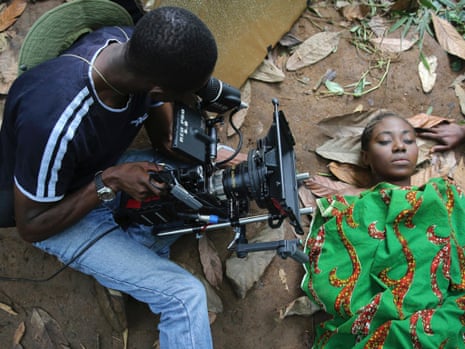Nigeria is now officially Africa’s biggest economy. Its GDP was revised up to £307bn this week, after economists re-adjusted the way they calculate the figures for more than 24 years. Most other countries go through this process (known as "rebasing") every five years.
The new number now incorporates the revenues from Nigeria's newest business sectors, including its booming film, music, telecoms and e-commerce industries, which had been previously been overlooked for more than two decades.
In view of this, here are five things you might not know about the newly recognised elements of Nigeria’s economy:
1. The movie industry, known as Nollywood, produces more films a year than any other country except India. In 2006, when the last comprehensive data was collected by Unesco, Bollywood released 1,091 major feature films, Nollywood 872, and their namesake, America’s Hollywood, trailed with 485. If you include the smaller, lower budget films Nigeria’s rises to more than 2,500 movies per year. Motion pictures, sound recording and music production are collectively now worth billions of pounds, and constitute 1.4% of the country’s £307bn GDP, according to the Nigeria Bureau of Statistics.
Unesco has attributed much of Nollywood’s success to the fact that it relies on low-budget productions (usually under £20,000) which are released on video CDs, a cheaper alternative to DVDs, and are usually sold for about a dollar each. The 2006 study estimated that 99% of screenings were in informal settings, such as people's homes rather than cinemas. Yet piracy is a huge problem for filmmakers, with an estimated five to 10 illegal discs circulated for every genuine one.
2. Only 20 years ago, Nigeria had one telecoms operator and around 300,000 telephone lines. The government vastly underestimated the market in 2001, saying it expected up to 10m Nigerians would be able to afford a mobile phone. Now, there are up to 120 million mobile phone subscribers in a country of around 170m people, and dozens of providers. (However, it is not uncommon for one person to have multiple phones on different networks, in an an attempt to combat notoriously bad service). According to the new data, telecommunications and information services contribute 8.69% of the country’s GDP, and with companies engaging in aggressive smart phone marketing, this is expected to grow.

3. Nigeria’s formal services industry has grown more than 240% compared with the last figure recorded in 1990. And just as Nollywood was an almost invisible industry in terms of official data, the country’s informal services – such as those provided by barbers, cobblers, cyber cafes, and street vendors – went under the radar until teams were dispatched in 2011 to record their contributions. Those which come under the “other services” category account for 1.68% of the country’s GDP.
4. Just over two decades ago Nigeria also had only one airline. Now it has several - with Arik Air and Dana Air being two of the most well-known. However, though "air transport" now accounts for 0.6% of GDP, this particular industry has been fraught with problems, with the country seeing a series of deadly crashes raising repeated questions over safety. In October 2005, a Bellview Airlines plane nose-dived in rural Nigeria killing 177 people, and in December that year 107 people died when a Sosoliso Flight carrying schoolchildren crashed in bad weather. In January this year Dana Air resumed flights 18 months after a crash outside Lagos killed 159 people.
Air travel has proved popular despite this, with 4.7 million air passengers travelling in 2012. A 2009 study for the World bank concluded that Nigeria’s aviation authority was “struggling to enforce quality, safety and security standards”. Harold Demuren, the director general of the aviation authority, said at the time that officials were working hard to make sure regulations were being followed.
5. Though Nigeria now boasts Africa’s largest economy, the figures have also highlighted familiar problems. Oil and gas revenues are by far the government’s main source of income although the industry is also plagued by allegations of corruption. Oil and gas contributed 14% of GDP under the new data, compared with 32% under the 1990 figures.
Though the new figures show Nigeria’s economy has grown 12.7% between 2012 and 2013, more than 60% of Nigerians still live on less than one dollar a day. “Inequality has been rising,” the finance minister, Ngozi Okonjo-Iweala, acknowledged when the new numbers were announced. “We have to work on building a social safety net to take care of those at the bottom of the ladder.”

Comments (…)
Sign in or create your Guardian account to join the discussion